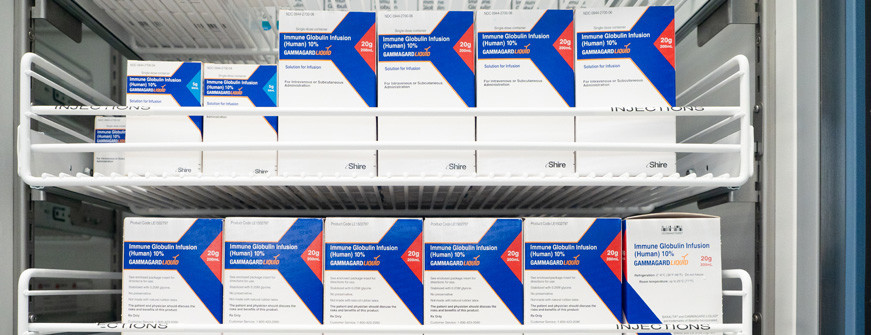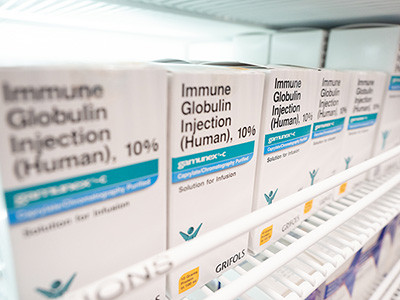
Immune globulin infusion is a treatment option designed to help patients with weakened immune systems by delivering antibodies to fight off infections and inflammation. Immune globulin can be administered intravenously (IVIG) or subcutaneously (SCIG). If you have recently been approved for IVIG treatment, you may be curious about the potential side effects you may experience. Learning about what to expect after your IVIG treatment can help you decide if it is right for you.
Although most recipients of IVIG handle the treatment quite well, there are those who experience side effects. These side effects may include fever, headaches, aching muscles, nausea, and stomach pains. Some may also experience an allergic reaction, typically caused by the added stabilizers and other inactive ingredients in the IVIG formula. Rare side effects of IVIG include aseptic meningitis (inflammation of the brain), liver problems, kidney failure, and hemolytic anemia (a condition that destroys red blood cells).
Experienced infusion centers and nurses will often take precautions to prevent or help minimize any side effects before beginning the treatment and will work to ensure your comfort and safety. Pre-medications such as Aspirin, Tylenol, and Benadryl are often administered before the procedure to address these known side effects. Additionally, administering the immune globulin at a slower rate may help prevent or lessen the severity of these side effects.
Post-treatment medications
If you experience any of the side effects listed above, you may be given medications to alleviate the symptoms after your treatment session. Acetaminophen or ibuprofen is often given to relieve headaches and fever symptoms including high body temperatures and body aches. Anti-nausea medication can be given to help with nausea and vomiting. Benadryl is also commonly administered in the presence of anaphylactic symptoms including hives, rashes, and shortness of breath.
Logging your results
 Ig is created from the extracted antibodies of thousands of blood donors and each manufacturer produces the end product with their own unique blend of stabilizers and liquids. Because of these variables, your body may react differently during each infusion session. It is important to log the side effects (or lack of) that you experience after each infusion so that your doctor can adjust your regimen. That may include slowing down your infusion rate, recommending a certain brand or switching to SCIG. Aside from logging side effects, you will also want to keep track of other factors including what you ate, your energy level, the comfort level of your infusion experience, and any discomfort from other outside factors. These can all have an effect on how your body responds to the infusion, and understanding how these factors come into play can help you prepare for future treatments.
Ig is created from the extracted antibodies of thousands of blood donors and each manufacturer produces the end product with their own unique blend of stabilizers and liquids. Because of these variables, your body may react differently during each infusion session. It is important to log the side effects (or lack of) that you experience after each infusion so that your doctor can adjust your regimen. That may include slowing down your infusion rate, recommending a certain brand or switching to SCIG. Aside from logging side effects, you will also want to keep track of other factors including what you ate, your energy level, the comfort level of your infusion experience, and any discomfort from other outside factors. These can all have an effect on how your body responds to the infusion, and understanding how these factors come into play can help you prepare for future treatments.
According to the Immune Deficiency Foundation, half of the infused immune globulin is metabolized within a three to four week period. Since IVIG is meant to infuse larger amounts of Ig, patients can normally go three to four weeks between treatments. SCIG, on the other hand, delivers smaller amounts of Ig and takes longer to be absorbed which often requires more frequent infusion intervals ranging from daily to weekly. IVIG patients often begin to see results from their treatments anywhere from six months to one year. During this time, your doctor will closely monitor and track to see if there are improvements in relieving the symptoms associated with your primary diagnosis. Logging how your body feels immediately after and in between your infusion sessions can help your doctor prescribe the best course of treatment to support your needs. If you experience weakness between your IVIG infusion sessions, your doctor may recommend switching to SCIG.
Each individual will respond differently to IVIG. Many will experience no side effects while others may experience mild to moderate side effects which can easily be managed by your medical professionals. Regardless of the side effects, the benefits of IVIG and SCIG treatment generally outweigh any temporary discomfort that may occur.


